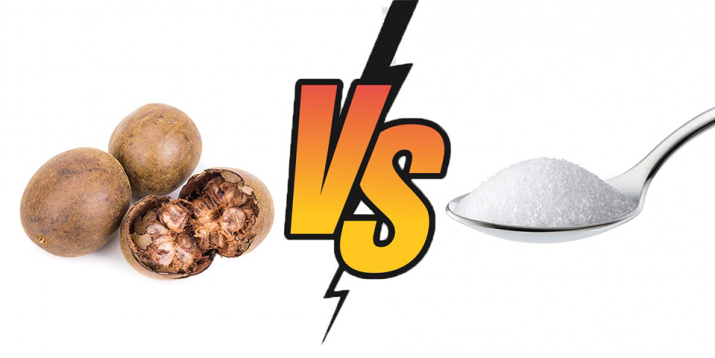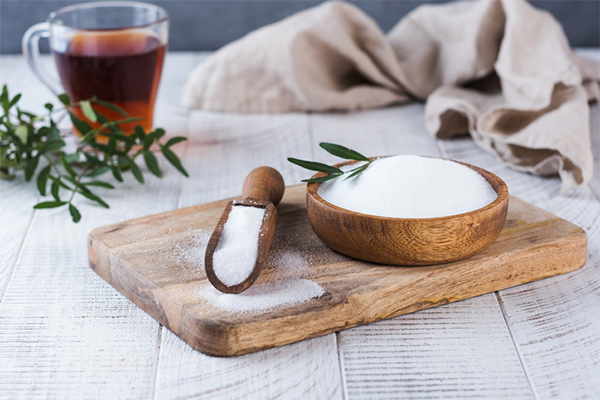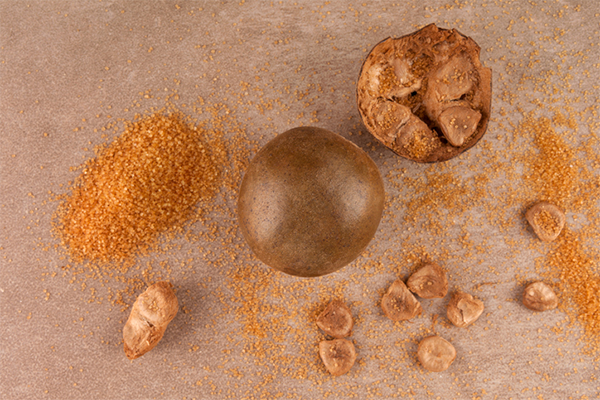Erythritol vs Monk Fruit: Which Sugar Substitute Is Better?

These days, natural sugar substitutes and alternative sweeteners fill the sugar aisle. Two popular sweet swaps are erythritol and monk fruit. Erythritol is a sugar alcohol, while monk fruit (luo han guo) comes from an Asian fruit. Both are non-nutritive, zero-calorie sweeteners.
Here’s a quick rundown of how erythritol and monk fruit compare, so you can decide which one (if either) is right for you.
What Is Erythritol?

Erythritol is a sugar alcohol created by fermenting wheat or corn starch, says Jamie Nadeau, RDN, a registered dietitian. It’s naturally found in fruits like grapes and peaches, mushrooms and fermented foods like beer, soy sauce, and cheese. You’ll find erythritol in “zero-calorie” or “diet” gum, candy, chocolate, and sweeteners (including some that also contain monk fruit).
Pros of erythritol
1. Doesn’t impact blood sugar
Erythritol provides no calories.
It’s excreted in urine and doesn’t impact your blood glucose and insulin levels.
2. Not “too” sweet
Sugar alcohols are less sweet than other sugar substitutes, ranging from 25% to 100% of sugar’s sweetness. Erythritol is about 60% to 80% as sweet as sugar.
3. Doesn’t promote tooth decay
Unlike sugar and other sweeteners that contain carbs, erythritol won’t lead to cavities or tooth decay.
4. No aftertaste
Unlike many other zero-calorie sweeteners, erythritol is thought not to leave a funny taste in your mouth. And, it’s sometimes mixed with more intense sweeteners to hide or reduce their aftertaste.
Cons of erythritol
5. It can cause GI issues
“Sugar alcohols like erythritol are notorious for causing GI distress such as gas, bloating, as well as causing a laxative effect,” says Nadeau.
Too much can cause diarrhea, but most healthy adults can tolerate erythritol in moderation, she says. Start with a small amount to avoid stomach upset.
6. Not a “whole food”
In order to extract the sweet components, Kreutzer explains that erythritol needs to be heavily processed.
7. May impact heart health
Researchers of a 2023 study found a potential link between erythritol and risk of cardiovascular events (strokes and heart attacks). However, there was no causal or direct relationship between erythritol consumption and cardiovascular risk, so more research is needed.
What Is Monk Fruit?

“Monk fruit extract has been used in south China for centuries but is relatively new to the rest of the world,” explains Nadeau.
Also known as luo han guo, monk fruit is used in traditional Chinese medicine.
Monk fruit is in the same plant family as gourds, pumpkins, and squash.
Pros of monk fruit
1. Contains zero calories
Like erythritol, monk fruit is a non-nutritive sweetener, says Cary Kreutzer, EdD, MPH, RDN, FAND, an associate clinical professor at the University of Southern California Leonard Davis School of Gerontology and USC Keck School of Medicine. That means it doesn’t provide any carbs, fat, or protein — it only delivers a sweet taste.
2. Contains no carbs
Monk fruit is appropriate for those on low-carb diets (including the ketogenic diet).
3. Sweeter than sugar
Monk fruit is 100 to 250 times sweeter than granulated sugar, so you can use less of it to achieve the same level of sweetness.
Cons of monk fruit
4. Not a “whole food”
Monk fruit sweetener needs to be processed in a laboratory to isolate the sweet components, explains Kreutzer.
5. May have an aftertaste
Monk fruit may have a “funny” taste to some.
However, one study found that it’s not as strong as other alternative sweeteners. A 2018 study in the Journal of Dairy Science found that of five reduced-sugar blends in vanilla protein shakes, the one with the most monk fruit (and 25% stevia) tasted the closest to sugar.
Is Erythritol or Monk Fruit Better for You?

“For most healthy adults, monk fruit extract and erythritol can both be useful sugar alternatives in moderation,” says Nadeau.
The FDA has approved both erythritol and monk fruit as GRAS or generally regarded as safe.
